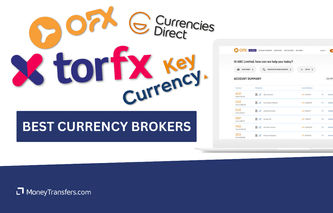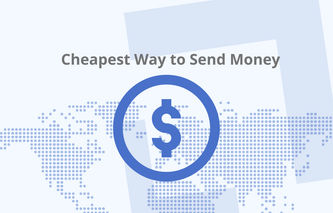Send Money Abroad
Many of us work away from home, or in live different countries to where our friends and families are. There are also more businesses selling products and services overseas. Together, these create a need for easy, and quick international money transfers.
In recent years, wide variety of online money transfer companies have emerged. These make sending money abroad cost effective and simpler than ever before.
Search Now & Save On Your Transfer
Pick by service type
There are different ways to send money abroad. Money transfer companies offer a rounded service. Currency brokers account management, and apps give you the power in the palm of your hand. Some providers offer all 3 options.
Pick by country
If you need to send to a specific country, our guides will help pick the best option.
Compare live rates
The best way to ensure you get a good deal on international transfers is to compare providers. Input the amount you need to send, and where you need to send it, and we'll compare options for you.
What’s the best way to send money abroad?
The right company can save you both money and time on international transfers. While banks offer international transfers, they often charge high fees. Exchange rate margins from banks can also eat into your transfer amount.
Fortunately, there are other options that can help you send money faster and cheaper than with a bank.
When you send money globally, the best way depends on where the transfer is going and how you want to send it.
Specialised money transfer providers enable quick and easy money transfers across the world. These companies are regulated and use their own technology, and networks, to offer bank-beating rates. Transfer speeds are often faster than banks as well.


Sending money through a money transfer company is often cheaper than banks, and PayPal. You will also get more payment and delivery options. We will learn about these in the coming sections.
So, what is the best way to send money abroad? Unfortunately, there is no single service that will prove the best in all situations.
You will need to evaluate the available options based on the amount and currency you are sending. Where you are sending the money to will also impact the costs, transfer times. Additional features might also help when choosing the best company for your transfer.
Some services are great for sending small amounts, while others can offer you hands-on service for large amounts. Some companies will offer multi-currency accounts and P2P payments. Each can speed up and reduce the cost of a transfer.
We always recommend a live rate search to ensure you're getting the best deal on sending money abroad.
Online money transfer services are almost always a better option than banks when transferring money abroad. However, it is important to compare your options.
Is there much difference between money transfer companies?
Yes. There are hundreds of money transfer companies that can help you send money abroad in a quick, convenient and secure way. But, not all are the same or work the same way.
These providers can be divided into three categories.
Money transfer companies: Also known as Money Transfer Operators (MTOs) and remittance companies. These companies use networks of agents and banks to process payments and complete transfers. These companies are best suited for sending small amounts of money quickly. They will generally charge a fixed fee, or percentage of a transfer, as well as a markup on the exchange rate. Examples of this types of companies include Wise, Zing, or Instarem. These companies usually offer many payment and delivery methods. These can include bank transfer, debit card and cash payments.
Currency brokers: Some transfer providers specialise in facilitating high-value transactions (generally over $/£10,000). Brokers usually provide tailored customer service, and an account manager for regular transfers. These companies work best when you have to transfer large sums of money abroad. They are great if you don’t want to pay the high bank fees, but for smaller transfers are as good as online options. Examples include XE, TorFX and Regency FX.
P2P companies. P2P stands for ‘Peer to Peer,. These providers enable you to send small and medium-sized amounts to directly to a recipient. These companies operate completely online (with no branches or cash pickup locations). They usually operate by pooling users’ money in each country in which they operate. This enables them to make transfers quickly once you have funded your transfer. The simply transfer the money to your recipient from the relevant pool. This means there's no need to actually send your money across borders and incur extra fees. P2P providers make a good choice if you have to make smaller transfers or regular payments home. Some money transfer providers offers this, as do digital banks. Wise or Revolut are generally the best options.
Reviews of money transfer companies
User feedback on money transfer companies
Compare companies
How do I send money abroad over the internet?
Multi-currency access has made sending money abroad easier and more accessible than ever. However, there are still a few steps you have to be aware of when transferring funds. Here’s a quick breakdown of how the process works with online money transfer providers:
Sign up for an account: Once you have chosen the company you want to use for your transfer, you will have to register for an account. They will need some basic personal information. This will include your name, email address, and contact details.
Verify your details: Before you can make a transaction, you will have to verify your details. This is done by providing copy of your ID such as driver’s license or passport. This may also be completed using a facial authentication alongside a photo of the ID. These requirements may vary by provider and send amount.
Set up your transfer: You will set up a transfer by providing recipient details such as name and account details. It's possible to also use an IBAN or equivalent.
Fund your transfer: There are several ways to send money to your transfer provider. A bank transfer being the most commonly offered, and cheapest, method. Some companies also accept debit/credit cards or cash payments. Accepted payment method varies from provider to provider.
Track the progress of your transfer: After you have sent your money online, it may take between a few seconds to a few days for transfer to fully complete. You can use the transaction number provided by the transfer company to track the progress of transfer.
Are there limits to the amount of money I can send online?
You can send any amount of money abroad online. It ultimately comes down to which company you choose for your transfer.
Some money transfer providers have limits on the amount you can send in a single transaction, per day or per week. So, it is important you make sure to choose a company that can cater for the size of the transfer you wish to make.
Then, be aware of any tax obligations on sending money. In some cases, you will need to make declarations in the country you are sending from or to.
What payment and delivery options are available when sending money online?
When you choose to send money abroad, there are various ways in which you can fund the transaction. Then there's different ways to receive money as well.
Some of the common payment and delivery options are:
Payment options
The methods through which you can fund your international transfer will vary depending on the provider you choose, but these are the most commonly available payment options:
Bank transfer: This is when you transfer money from your bank account to your payment provider account. From there, the provider will transfer funds to the recipient.
Credit/debit card: Many online money transfer providers accept card payments. It is worth checking the rates before sending your money this way though. It is often the most expensive method and credit cards can attract cash advance fees.
Cash: Some providers offer the option to fund your transfer in cash. This is done by attending one of their branches or agent locations. This is most common with remittance companies.
Multi-currency balance: If you have a multi-currency account, as you can with Wise, it is possible to use an existing balance for a transfer.
Delivery options
As with funding a transaction, there are a variety of ways that you can have money delivered.
These include:
Bank deposit. This is the most common delivery option and requires no action on behalf of your beneficiary. You enter their bank details to send money to. Usually the money will appear within their account usually within 1-3 days.
Cash pickup. If offered, your recipient can collect the money you have sent in cash at one of the company’s pickup locations.
Home delivery. In some countries, such as the Philippines, it is possible to have cash delivered to your beneficiary’s doorstep.
Digital wallets. Although less common, some companies will allow transfers to a digital wallet. – such as Neteller.
Mobile payments. A few providers will enable money to be sent straight to your recipient’s mobile wallet.
How much does it cost to send money abroad?
The cost of sending money globally depends on a variety of factors including:
The source and destination country
Amount being sent
Currency to be transferred
Payment and delivery methods chosen.
The most common costs associated with online money transfers include:
Fixed fee: Money transfer companies often charge a fixed transfer fee. This can range from $1.99-$39.99 – or can be even higher depending on where the money is going. Sending money abroad on some less common routes generally costs more. However, there are providers out there who charge zero fees.
Exchange rate margin: If a company says “no transfer fee”, it means they are charging you in some other way. Often, money transfer providers charge a margin on top of the mid-market exchange rate. This is to cover their costs and generate profits. Banks tend to charge a higher margin compared to specialised money transfer companies. The exchange rate margins charged by online providers are usually between 0.5% and 2%. However, banks and some remittance companies may charge a higher mark-up.
Sending and receiving fee: In some cases, depending on how you choose to fund your transfer abroad, you may have to pay a sending fee. The recipient may also need to pay a fee to receive foreign exchange in their bank account.
How fast can I send money internationally?
The speed of a transfer will again depend on a variety of factors.
The advent of online money transfers has made transferring money abroad pretty fast.
However, international transfers on some less-common routes may take longer.
The speed will depend on the payment method, service provider, currency, and amount sent. Transfers initiated during off-banking hours or during bank holidays may take longer.
In general, if you’re sending money abroad using a bank transfer as a payment method, it will commonly take 1-3 working days.


Can I track money I’ve sent online?
Yes, and very easily. When you send money abroad, your service provider will generate a transaction ID for the transfer. You can use this transaction ID to track the progress of your payment. You can check the status online or call up or email customer care.
Where to go next
Sending money internationally is quick, safe and convenient.
Sending money abroad via a banks is often both more expensive and slower than using money transfer services.
Specialised money transfer companies help you save money on your international money transfers. They offer flexibility and speed on transactions all over the world.
However, it is important that you choose the right company for your transfer needs, as not all services are the same.
To send money abroad, you’ll need to register an account with a payment provider, fund the transaction and send the payment. You can track the transfer using the transaction number provided by the company. The transfer may be instant or may take a few days depending on where the money is coming from and going, and how.
It is also worth bearing in mind that there are two main types of charges that you’ll often have to pay when sending money internationally. The first is a fixed transfer fee and second is the margin on the mid-market exchange rate. You may have to pay one or both the costs depending on the provider you choose. It is always important to check that any provider offers a good deal on both of these factors.
Our comparison tool can help you find the best provider to help you send your money online. Compare live rates to be sure the maximum amount possible reaches your recipient.
Compare money transfer providers
Help & FAQ
Get answers to the most common questions asked when sending money abroad. Covers costs, fees and the best way to compare.
Related Content


Contributors


















